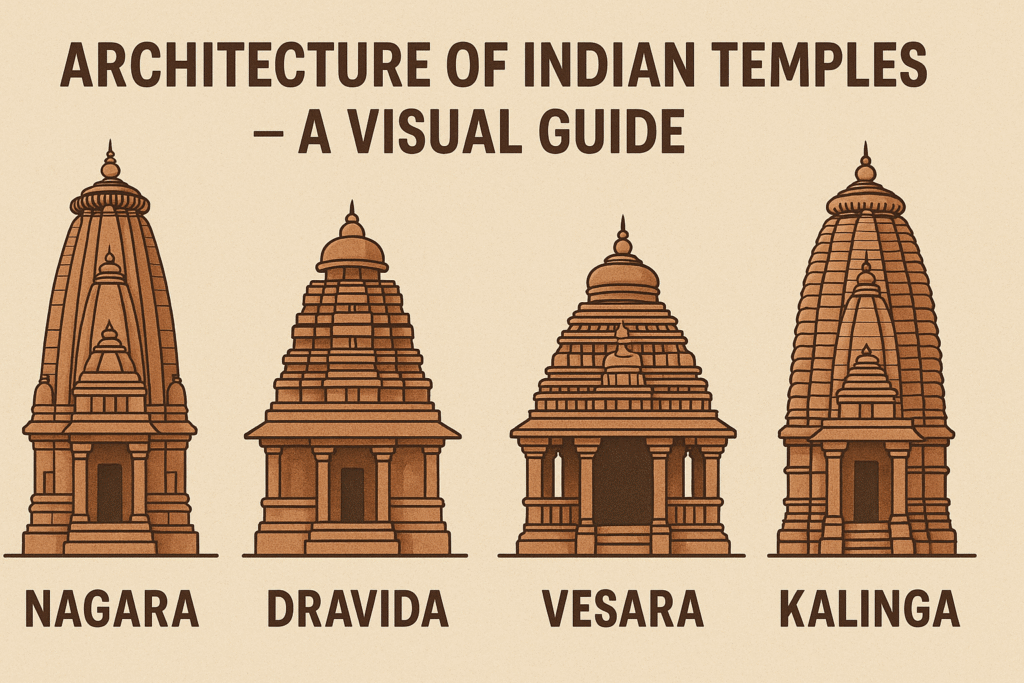🛕 Architecture of Indian Temples – A Visual Guide to Styles & Symbolism
Explore the rich architecture of Indian temples through a visual guide covering Nagara, Dravidian, Vesara, and unique regional styles. Discover their meanings, elements & evolution with TheIndiaTourism.in.
🪔 Introduction: Where Divinity Meets Design
The architecture of Indian temples is a breathtaking blend of spiritual symbolism, regional culture, and stunning craftsmanship. Across India, temple structures are not just places of worship—they’re living museums of heritage, philosophy, and cosmic geometry. This visual guide by TheIndiaTourism.in will walk you through the major temple styles, key elements, and architectural wonders that define India’s sacred skyline.
🏛️ The 3 Major Styles of Indian Temple Architecture
1. 🛕 Nagara Style – North India
| Feature | Details |
|---|---|
| Shikhara (Tower) | Beehive-shaped, curving upward |
| Base (Jagati) | Typically square or star-shaped |
| Example Temples | Khajuraho, Konark Sun Temple, Baidyanath Dham |
✅ Found across: Uttar Pradesh, Odisha, Madhya Pradesh, Bihar
2. 🛕 Dravidian Style – South India
| Feature | Details |
|---|---|
| Gopuram | Tall, elaborate gateway tower |
| Vimana | Pyramid-shaped inner shrine tower |
| Example Temples | Meenakshi Temple (Madurai), Brihadeeswara (Thanjavur), Rameswaram |
✅ Found across: Tamil Nadu, Andhra Pradesh, Karnataka
3. 🛕 Vesara Style – Deccan Hybrid
| Feature | Details |
|---|---|
| Fusion of Nagara and Dravidian traits | |
| Circular base, curvilinear tower, pillared halls | |
| Example Temples | Pattadakal Group (UNESCO site), Hoysaleswara Temple |
✅ Found in: Karnataka, Telangana
🔍 Key Architectural Elements You’ll See
| Element | Meaning & Use |
|---|---|
| Garbhagriha | Sanctum sanctorum, where the main deity resides |
| Shikhara/Vimana | Tower above the sanctum, symbol of Mount Meru |
| Mandapa | Pillared prayer or dance halls |
| Gopuram | Ornate gateway, often larger than the sanctum itself |
| Pradakshina Patha | Circumambulatory path around the sanctum |
| Kalasha | Finial at the top of the tower, represents immortality |
🧱 Regional Variations Worth Exploring
🏜️ Bengal Temples
-
Terracotta Panels, curved roofs (chala style)
-
Example: Bishnupur Temples
🏞️ Northeast India
-
Simpler forms, tribal symbolism, bamboo-inspired
-
Example: Chandranath Temple (Tripura)
🏔️ Himalayan Temples
-
Wooden and slate-roofed shrines, earthquake-proof
-
Example: Hadimba Temple (Manali), Baijnath Temple
🎨 Symbolism in Temple Design
-
Mandala Geometry: Temple layouts follow Vastu Purusha Mandala
-
Mount Meru Model: The tower represents the mythical cosmic mountain
-
Five Elements: Temples often symbolize earth, water, fire, air, space
Did You Know? Every part of a temple—from steps to ceiling—represents a spiritual journey from the material world to moksha (liberation).
🏛️ Famous Architectural Marvels You Must See
| Temple | Style | Known For |
|---|---|---|
| Brihadeeswarar (Thanjavur) | Dravidian | Monolithic cupola, granite construction |
| Sun Temple (Konark) | Nagara | Chariot-shaped layout, stone wheels |
| Kailasa Temple (Ellora) | Rock-Cut | Entirely carved from a single rock |
| Chennakesava Temple (Belur) | Vesara | Hoysala art & soapstone carvings |
| Meenakshi Temple (Madurai) | Dravidian | Multi-colored gopurams & intricate murals |
🧭 How to Explore Temple Architecture in India
-
🚗 Plan your route with DreamSafar.com
📞 WhatsApp: 9650747276 -
🏨 Book stays near architectural sites or temple towns via
GangasagarEcoTourism.com
📞 WhatsApp: 7550910009
🔗 Useful Link Suggestions
❓FAQs: Architecture of Indian Temples
What’s the difference between a gopuram and a vimana?
A gopuram is the monumental entrance tower, while a vimana is the tower above the sanctum.
Which temple has no shadow at noon?
Brihadeeswarar Temple in Thanjavur—its shadow never falls on the ground at noon due to unique design.
Can I study temple architecture formally?
Yes! Institutions like the Indian Institute of Architecture, IGNCA, and ASI offer heritage and temple studies.
🌼 Conclusion: Where Art Meets the Almighty
The architecture of Indian temples is more than stone and sculpture—it’s a divine dialogue in design. Whether you’re an art lover, history buff, or spiritual seeker, understanding temple architecture deepens your travel experience across India. Let TheIndiaTourism.in guide your journey with trusted travel support from DreamSafar.com and GangasagarEcoTourism.com.
Indian temple architecture, Nagara style, Dravidian temples, Temple symbolism, Ancient temple design, TheIndiaTourism.in


